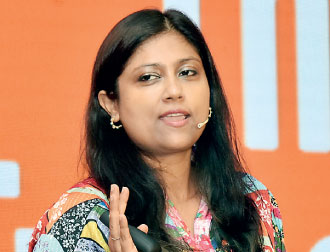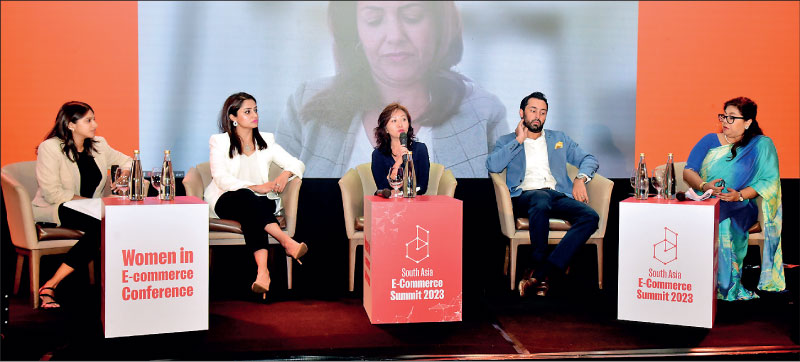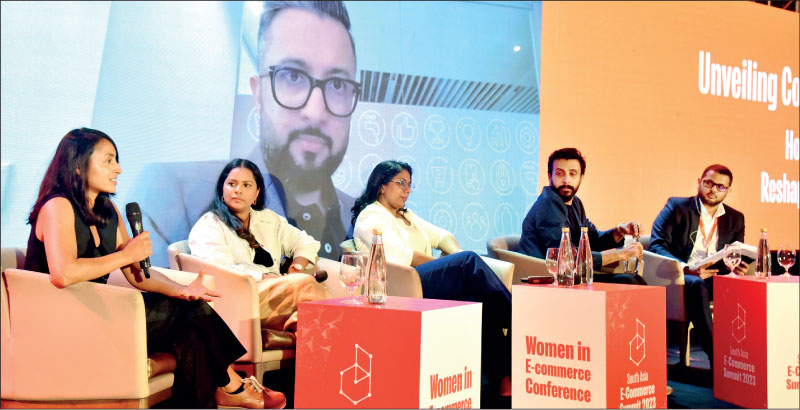Thursday Feb 19, 2026
Thursday Feb 19, 2026
Wednesday, 18 October 2023 01:40 - - {{hitsCtrl.values.hits}}

Daraz Group Chief Financial Officer Kiran Faruqi

Copia Founder Komal Ahmad

Google South East Asia Head of Performance Shabana Badami

Clovia Founder and Chief Revenue Officer Neha Kant

SheCapital Founder Anisha Singh

MCaffeine Co-Founder and Chief Growth Officer Vaishali Gupta

Retention Marketing Head Lipsa Satpathy

Unisoap Founding Director Pauline Grumel
By Divya Thotawatte
E-Commerce will enable financial growth and independence of women while tools like AI can be used to dissolve gender disparities within the business world, said female entrepreneurs and executives recently, highlighting methods of winning at e-business.
The South Asia E-Commerce Summit 2023 organised by Daraz was held last week where accomplished women business executives and entrepreneurs shared advice and information about building a successful online business. Speaking at the conference, Daraz Group CFO Kiran Faruqi highlighted that curiosity, determination and perseverance were essential qualities for an ebusinesswoman.
“In my experience, E-Commerce is one of the biggest tools that women can use to empower themselves. It brings a lot of benefits – you can start commercial activity with fairly low startup capital, you will have access to a much larger market than if you would have opened a shop down the street, and you will learn global skills that you could use interchangeably. Most of all, you will have your financial freedom.”
However, E-Commerce is demanding and is heavily influenced by tech innovation. Faruqi said that in order to succeed, it is important to stay ahead of trends on how people like to buy and thereby, create content that is accordingly adapted. Having an assortment that entices people is crucial, and pricing it well is equally important, she said.
Copia Founder Komal Ahemed spoke about the purpose that is a necessary part of entrepreneurship. She said: “Building a company that is both for-profit and for purpose is not impossible. The assumption that purpose doesn’t go with profit is merely a myth. One woman with a simple idea can make a world of a difference but a group of people banded together can rid the world of unnecessary and solvable problems.”
She stressed the potential of E-Commerce to empower women while fulfilling their purpose and generating revenue at the same time. She highlighted that while some E-Commerce processes can be costly, like transportation and distribution, the use of pre-existing platforms like Uber and Daraz becomes efficient when starting an e-business.
South Asian women and E-Commerce
Google South East Asia Head of Performance Shabana Badami highlighted how women in E-Commerce were increasing rapidly as it simultaneously empowered and allowed them better financial security and independence as well. The digital transformations taking place in South Asia have the potential to create a transformative effect on women entrepreneurs. South Asia’s E-Commerce market is expected to grow to 385 billion by 2025 where women will play a significant role. Women will account for 40% of all E-Commerce sales by 2025, she explained.
“Women as business owners and entrepreneurs were already active participants in E-Commerce. Nearly a third of all the businesses in Indonesia, two-thirds of businesses in the Philippines are women-owned. That is moving forward. The number of women-owned businesses in the E-Commerce sector is supposed to grow by 50% by 2025.
This growth will be delivered by a number of factors including smartphones, internet access, E-Commerce, Government programs and private sector initiatives as well.”
Women are also being increasingly employed in the E-Commerce sector. According to a report done by IFC, the number of women in the E-Commerce sector in South Asia is expected to grow by 35% by 2025. Therefore, women as consumers, entrepreneurs and employees are playing an increasingly important role in E-Commerce.
Badami further explained that this exponential growth of E-Commerce in South Asia represented the opportunity to close gender gaps and open more markets for women-owned businesses. Women entrepreneurs and employees could then create more opportunities and contribute to the growth across the region.
“We have seen an upward growth in E-Commerce in the region in countries like Pakistan, Bangladesh and Sri Lanka and in spite of the economic challenges faced by Sri Lanka, eCom searches in the country have increased by 25% in the country. E-Commerce users in Sri Lanka are to amount to 10.2 million by 2027 and user penetration is expected to hit 46.1% in contrast to its 38% user penetration in 2023.”
She said that the annual E-Commerce GMV growth in Sri Lanka is expected to increase by 15.3% between 2022 and 2027 in Sri Lanka. Electronics, food and fashion will be the key contributors. AI is also increasingly used in the region which has enabled the growth of its E-Commerce and businesses.
“According to statistics, globally, 44% of businesses in the E-Commerce sector are using some form of AI. This number is expected to grow to 70% by 2025. AI has the potential to transform E-Commerce by enhancing customer experiences, optimising operations, improving decision-making, etc. AI is one of the most profound technologies of today which would further contribute to the growth of E-Commerce and its users.”
The Internet has changed the way we do business and the revolution of AI will change how we do business, stated Badami. It is therefore wise to make investments in scalable business solutions that will have a lasting impact on the business, she advised.
“AI applications have the potential to influence all aspects of a business; reaching customers with the right experiences, product reclamation, providing efficiency using their past purchase and search histories, customer service chat boxes, etc. It helps businesses to increase their savings and improve customer experience. It can help you detect and reduce fraud and protect your customers.”
AI also has the capacity to do inventory management, said Badami. AI is currently used by global retailers to monitor inventory levels in their stores and shelves, for predictions of when to restore, and for the reordering for the customers.
AI is an efficient tool that would ensure the success of a business. It would also empower women due to its accessibility, its democratisation and the little resources required to utilise it. Therefore, AI has the potential to reduce gender disparities in E-Commerce and in the business world in general as well.
“More and more women will be able to learn AI and utilise it regardless of their background. AI is available for a very low cost which makes it affordable for women to achieve their goals.” Badami recommended resources like the Google Cloud Skill Boost Platform which is free and an effective way of improving online skills.
Keeping pace and generating revenue
Collecting data and understanding the target audience’s needs is key for growth through E-Commerce, explained Clovia Founder and Chief Revenue Officer Neha Kant. She elaborated that most brands operated from the perspective of manufacturers and provided fewer choices which may not entirely be beneficial for the business.
“We came up with a lot of solutions for this, we put out products of different sizes, and catered for different body shapes and put it out on the Internet for feedback. The Internet is like a large democracy and we can use it to test and collect feedback about sales, engagement with customers, understanding of their liking, and how the product is received in general. Durability is important, so start collecting data because that is good business sense.
Extensive data collection is necessary to explain that every business decision about the product must be taken concerning the data collected. Therefore, instead of production plans of over six months that were traditional in the industry, Clovia operated on optimal 30/40 day production plans which were more advantageous.
Capturing and retaining the interest of the customers is also crucial. “We offer something new every week. Even though we are an essential business, you can’t bore your customer. We want to offer something new and fresh to look forward to, even in an essential category.
Markets today also contain much diversity with customers with various needs and requirements. It is also smart to take into account these requirements and cater to those different markets, with adjustments made to the sizing of products, pricing, fashion, etc.”
However, even with the smartest strategies, it could take time for a new business to make big sales, Kant noted. Hence, the business should also focus on generating revenue to invest in the business. Therefore, Clovia has used online media platforms for monetary gains, creating multiple streams of income for the business.
“Google and Facebook are expensive and would usually give very little back. It is difficult to have monetary gains if you’re solely dependent on those platforms to bring you customers. So you have to think smart and think of ways to attract customers without spending money.”
Furthermore, marketing and advertising campaigns through social media should be relatable with fewer portrayals of any unreal ideals that would detach the customer from the product. But make the marketing campaign interesting, inspiring and exciting to the customer too, she added.
“All lingerie businesses will talk about similar issues like comfort or about the fabrics used. That does nothing to inspire the imagination of the customers. We had to make customers wonder what more they can get or what is new with the products.
Education can be boring, so we changed the voice of the brand to be fun and joyful. It turned the tables for us and made our products ‘cool’ and wanted, so a lot of people started visiting our websites and purchasing our products. Finding interesting ways to market is important.”
Working with celebrities and social media influencers to promote the products is another performance strategy. It can be done cost-efficiently too, Kant said.
SheCapital Founder Anisha Singh and MCaffeine Co-Founder and Chief Growth Officer Vaishali Gupta shared similar thoughts about marketing. In the beginning stages, a business could hardly have the luxury of marketing on big distribution channels. In this context, guerrilla hacks could help and it does not require expensive or glamorous strategies, Gupta advised.
“When we were starting out in 2017/2018, we didn’t have enough money to market our products. Our bestseller was a coffee powder body scrub, which was loved by our customers, but it wasn’t reaching the wider audiences. Therefore, we got a stock of 300 products, and looked for the right key opinion leaders with a considerable amount of social media following who belong to our target groups and could raise awareness about our products.”
Gupta said that the company then wrote personal notes to those key opinion leaders explaining the innovations and important iterations that had gone into the creation of the products. “Out of the 200 people who were sent to, 150 key opinion leaders posted not only about our products but also of the story that we shared of our product on Instagram.”
Customers love stories and innovation. Therefore, innovating and sharing stories of that innovation and the product will be significant, she noted.
A panel discussion with Foodpanda Pakistan Communications and Legal Public Affairs Director Hassan Arshad, United Nations’ Secretary General’s High Level Panel on Women Empowerment Member and Global Strategic Development Advisor Fiza Farhan, Malaysia Digital Economy Corporation National Roadmap and Cross Border Rules Director Laura Ho, FBCCI Vice President e-Commerce Association (e-CAB) President Shomi Kaiser and Khibraty Founder and Partner of MakanE Abeer Qumsieh was held next where the speakers spoke on how governments can create enabling eco-systems for entrepreneurs in e-commerce.
Another panel discussion was held on the topic of how e-commerce is reshaping shopping habits with speakers Zivame Founder Richa Kar, Reckitt Pakistan Marketing Director Ahmed Rizvi, Absolute Basics Founder Christeen Silva, Junaid Jamshed E-Commerce Head Muhammad Salik Gadit, and Visa Sri Lanka and Maldives Country Manager Avanthi Colombage.
A session on driving customer growth through personalisation and engagement was conducted by Aditya Birla Fashion and Retail Growth and Retention Marketing Head Lipsa Satpathy. Unisoap Founding Director Pauline Grumel spoke on the future of sustainable leadership.
Social Media Lab: Maximising Your Marketing Strategy and Mastering Social Media for E-commerce
Mentoring sessions were later conducted by United Nations’ Secretary General’s High Level Panel on Women Empowerment Member and Global Strategic Development Advisor Fiza Farhan, Clovia Founder and Chief Revenue Officer Neha Kant, Copia Founder Komal Ahemed, Google, and ADA Asia.
– Pix by Upul Abayasekara

Moderator - Daraz Head of Corporate Affairs and ESG Anishka de Zylva, UN Secretary General’s High Level Panel on Women Empowerment Member and Global Strategic Development Advisor Fiza Farhan, Malaysia Digital Economy Corporation National Roadmap and Cross Border Rules Director Laura Ho, Foodpanda Pakistan Communications and Legal Public Affairs Director Hassan Arshad, and FBCCI Vice President and e-Commerce Association (e-CAB) President Shomi Kaiser at the panel

Zivame Founder Richa Kar, Visa Sri Lanka and Maldives Country Manager Avanthi Colombage, Junaid Jamshed E-Commerce Head Muhammad Salik Gadit, and Moderator Daraz Head of Traffic Operations Firaz Markar at the panel